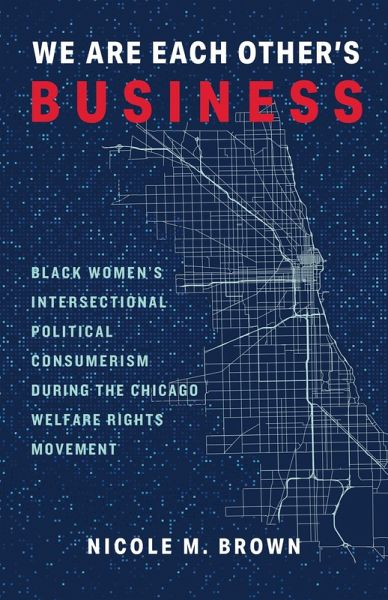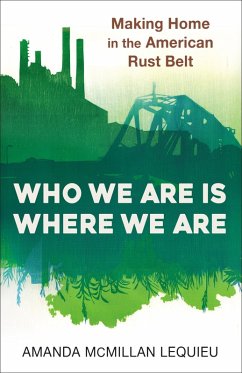
We Are Each Other's Business (eBook, ePUB)
Black Women's Intersectional Political Consumerism During the Chicago Welfare Rights Movement

PAYBACK Punkte
12 °P sammeln!
In the 1960s and 1970s, the Welfare Rights Movement organized at both local and national levels, advocating for poor people's inclusion, dignity, and autonomy. We Are Each Other's Business examines Black women's leadership within the Chicago Welfare Rights Movement, recasting their consumer activism as a form of Black feminist technology.Nicole M. Brown calls for understanding the Black women of the Welfare Rights Movement as sophisticated strategists who engaged the tensions among capitalism, consumerism, and economic liberation. She analyzes Black women's engagement with consumer credit, tra...
In the 1960s and 1970s, the Welfare Rights Movement organized at both local and national levels, advocating for poor people's inclusion, dignity, and autonomy. We Are Each Other's Business examines Black women's leadership within the Chicago Welfare Rights Movement, recasting their consumer activism as a form of Black feminist technology.
Nicole M. Brown calls for understanding the Black women of the Welfare Rights Movement as sophisticated strategists who engaged the tensions among capitalism, consumerism, and economic liberation. She analyzes Black women's engagement with consumer credit, tracing how they linked consumption with citizenship and critiqued the state's treatment of the poor. Brown offers a radical reframing of the struggle between Black women and the state as a battle of technologies, showing how Black women challenged "algorithmic assemblages of race, class, and gender" and "analog algorithms of poverty." She also shows how racism, sexism, and classism stifled opportunities for alliances: although the Welfare Rights Movement converged with consumer and women's rights movements, white and middle-class activists were unwilling to recognize poor Black women as fellow political actors. Bringing together historical sociology, computational methods, and intersectional Black feminist theory, We Are Each Other's Business offers innovative and generative insights into Black women's struggle for political and economic equity.
Nicole M. Brown calls for understanding the Black women of the Welfare Rights Movement as sophisticated strategists who engaged the tensions among capitalism, consumerism, and economic liberation. She analyzes Black women's engagement with consumer credit, tracing how they linked consumption with citizenship and critiqued the state's treatment of the poor. Brown offers a radical reframing of the struggle between Black women and the state as a battle of technologies, showing how Black women challenged "algorithmic assemblages of race, class, and gender" and "analog algorithms of poverty." She also shows how racism, sexism, and classism stifled opportunities for alliances: although the Welfare Rights Movement converged with consumer and women's rights movements, white and middle-class activists were unwilling to recognize poor Black women as fellow political actors. Bringing together historical sociology, computational methods, and intersectional Black feminist theory, We Are Each Other's Business offers innovative and generative insights into Black women's struggle for political and economic equity.
Dieser Download kann aus rechtlichen Gründen nur mit Rechnungsadresse in A, D ausgeliefert werden.












